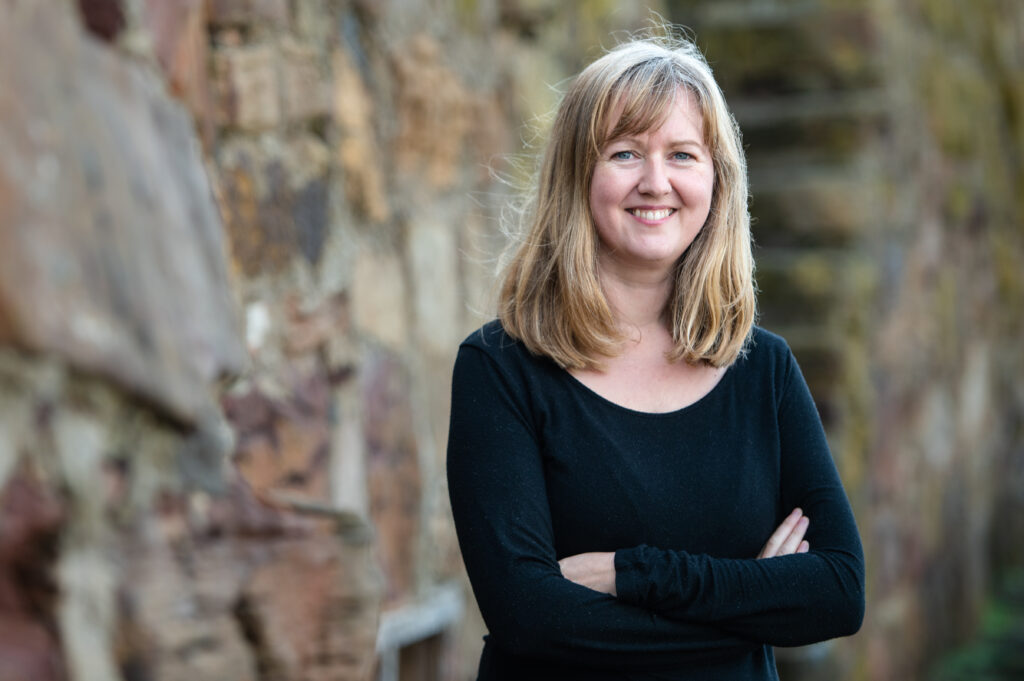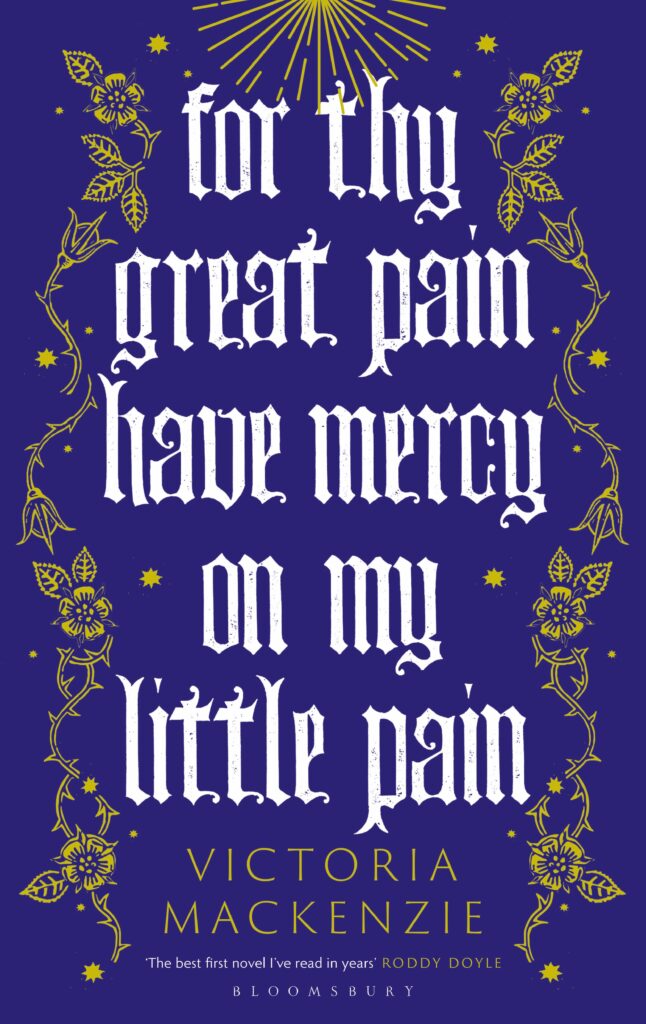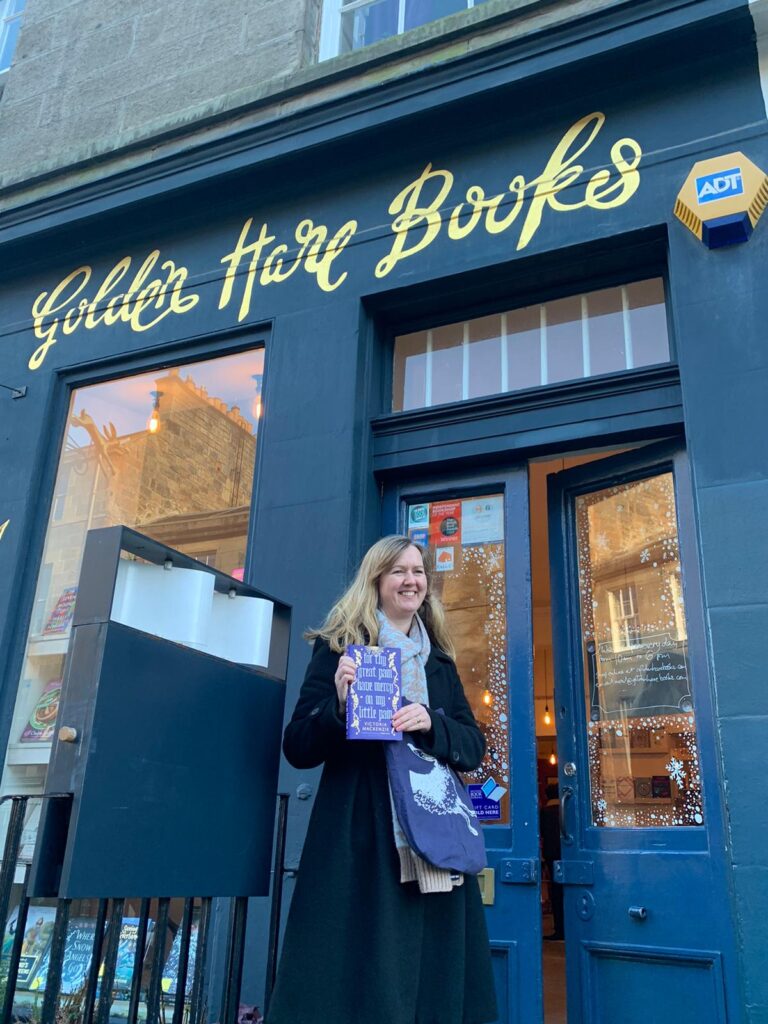From graduation to Guardian-featured author
Victoria MacKenzie, MLitt 2008, PhD 2013, describes her literary journey from a Masters in Creative Writing to published author.

Creative Writing Masters
In 2007 I moved from Brighton to St Andrews to study for a Masters in Creative Writing, focusing on Poetry. It was a leap into the unknown – I’d only been to Scotland twice and I’d never visited St Andrews. But as soon as I glimpsed the long sandy beaches and the town’s iconic skyline, I knew I’d made the right decision.
I chose St Andrews because of the stellar poets on the English faculty, and my MLitt was taught by the acclaimed poets Don Paterson and Douglas Dunn. There were eight students in my year and we had weekly seminars on the craft of writing as well as plenty of one-to-one feedback on our poems. We were encouraged to read as much poetry as we could and to share books and recommendations with our classmates. I learned so much and made some wonderful lifelong friends. I also met a young poet called Garry MacKenzie and we got married in 2012, but that, as they say, is another story!
My final poetry portfolio was shortlisted for an Eric Gregory Award by the Society of Authors and a poem from this collection won the Robert McLellan Poetry Award that year. This was a huge boost to my confidence and I felt certain I wanted to make poetry part of my working life. A year later I returned to St Andrews to study for a PhD, supervised by the poet Robert Crawford. My thesis explored how contemporary poets respond to scientific ideas in their writing. I’ve always loved interdisciplinary thinking and I relished researching my PhD. However, the poetic muse left me during my studies and I started writing short fiction instead. My supervisor was incredibly supportive of my ambitions to write fiction and to this day he continues to write references and offer encouragement. I owe him, and the University of St Andrews, so much.
The switch to fiction
I passed my PhD viva in 2013 and started working as a freelance creative writing tutor. My teaching was all online which meant I could live wherever in the world I wanted – but I didn’t travel far, choosing to settle in Crail, one of the picturesque fishing villages just down the coast from St Andrews.
My PhD thesis had been 80,000 words and this got me thinking. Novels were often about 80,000 words. Maybe I could try writing a novel? I jumped in with both feet and began researching the life of Victorian art critic John Ruskin, someone who had fascinated me for a long time. He is somewhat out of fashion in the 21st century – though I hope my novel might change this! – but the impact of his thinking and writing on modern life has been huge. Ruskin inspired people as diverse as Tolstoy, Gandhi and William Morris, and his followers created the National Trust. He had a tragic personal life and a series of nervous breakdowns resulted in him being unable to write for the final decade or so of his life. Ruskin was an ambitious topic for a novel and I worked on it for five years, alongside teaching creative writing and writing more short stories.
It all went well in so many ways. I won several emerging writer prizes and secured funding to finish my novel from Creative Scotland. However, once the book was finished, I struggled to find an agent or a publisher. This had not been part of the plan and it was very hard to take. Eventually, I decided to set the book aside and to write something completely different.
From graduation to Guardian-reviewed author!
It was spring 2020 and the world was a very strange place. I’d been thinking about the medieval anchoress Julian of Norwich as a potential novel subject for a couple of years. Lockdown seemed the perfect time to write about a woman who lived in a single room for over thirty years!
Being an anchoress is rather like being a nun – you dedicate your life to prayer and contemplation – but unlike a nun you also take a vow of ‘anchorage’, that is, a pledge to remain in a single place for the rest of your life. We know nothing about Julian (not even her real name!) other than that she lived in a single cell off the Church of St Julian in Norwich, in the east of England, and that she experienced sixteen ‘shewings’ or visions of God. She didn’t share her visions with many people, but she wrote about them in her book, Revelations of Divine Love, the first known book by a woman in the English language.
When I started researching Julian, I came across one of her contemporaries, Margery Kempe. Like Julian, Margery experienced holy visions, but as a merchant’s wife and mother of fourteen children she had a rather different kind of life from Julian the anchoress. Margery boasted about her visions to anyone who would listen. This was highly courageous in some ways – to claim a direct line of communication with God risked accusations of heresy, and the punishment was to be burnt at the stake. In 1413 Margery visited Julian in her anchoress cell to ask her advice. We know this because Margery dictated her life story to a scribe towards the end of her life, and she mentions asking the anchoress for her ‘wise counsel’. Margery’s dictated story, known as The Book of Margery Kempe, is the first known autobiography in English by a man or a woman.
I couldn’t resist imagining what these two women – with so much in common yet with such different lives – would have said to each other! At this point my book took off and I wrote it quickly, in about nine months. Once it was finished I sent it out to a small number of agents and I was fortunate enough to find one almost immediately – Sam Copeland at RCW. He then secured me a two-book deal with Bloomsbury. After so many years of writing, I was finally going to be a published author!
Publication and reviews

In January 2023 my debut novel, For Thy Great Pain Have Mercy On My Little Pain, was published and its reception was beyond anything I’d hoped for. It was Book of the Day in The Guardian, described as ‘an extraordinary novel about two extraordinary women’ by writer Frank Cottrell-Boyce. I was interviewed on Radio 4’s ‘Front Row’ – its flagship evening arts review programme, and I was a guest on Radio 3’s ‘Free Thinking’ programme about Julian of Norwich.
More reviews of my novel swiftly followed. It was Book of the Month in The Times and Editor’s Pick in Marie Claire magazine, and it was warmly reviewed in The Observer, The Sunday Times, The Financial Times, The Independent and The Telegraph. I’ve been invited to give readings at bookshops and literary festivals up and down the country, with many more events to come. It has been a wonderful whirlwind of activity but I think the fact that it took me so long time to reach this point helped me to keep my feet on the ground. That and caring for my one-year-old baby at the same time!

Advice to aspiring writers
I strongly believe that it’s impossible to be a good writer without being a good reader. Read widely, read deeply, and read like a writer – by which I mean, think about the craft of what you’re reading: how the writer has created tone, tension, character, setting; how they play with readers’ expectations; how they use dialogue, imagery, metaphor, vocabulary and syntax. Reading is simply the best way to learn the craft of writing.
My second piece of advice is to persevere. Success in writing doesn’t come easily to anyone. Rejection is part of a writer’s life, and you need to get used to it and stay motivated. International residencies and invitations to read at book festivals are lovely, but 99% of the time a writer’s life is about getting the words on the page and redrafting those words more often than you’d believe possible.
Finally, find other people who are as interested in reading and writing as you are. Share your work and get feedback on it and be willing to learn from others. Doing a Masters in Creative Writing is one route to learning your craft, but not the only one. You certainly shouldn’t feel that a qualification is an essential requirement to becoming a writer. My Masters helped me to find a group of like-minded people to share my work with, and also taught me about the discipline needed to finish projects, but informal writing groups can be fantastic.
Future plans
I’m currently rewriting Brantwood – my novel about John Ruskin – as I’m delighted that it will be published by Bloomsbury in 2025. In the nearer future I’m doing lots of readings from For Thy Great Pain, including at the Edinburgh International Book Festival in August and the Wigtown Book Festival in September.
Victoria MacKenzie also works as a freelance creative writing tutor and mentor and can be contacted at https://victoriamackenzie.net/. Alumni are welcome to get in touch if they are looking for support with their writing or would like more information about her online creative writing courses in autumn and spring.